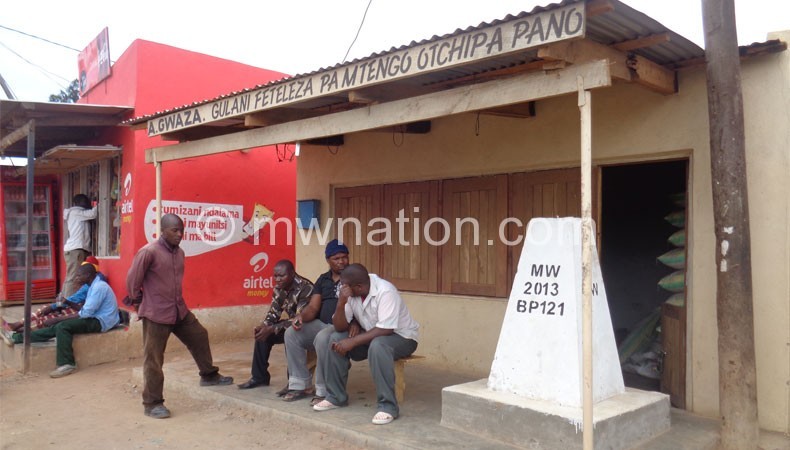Tsangano residents in border tussle

the beacon was planted
Some Malawians living at Tsangano Trading Centre in Ntcheu recently resisted giving up what they argue is their ancestral land to their Mozambican counterparts until security forces and conciliatory language by Malawian officials cooled the tempers, but left the people confused.
This follows an ongoing border re-demarcation exercise among Malawi, Zambia and Mozambique which in many cases has been far from perfect.
But Tsangano residents say the exercise in the area has been nothing “but ugly and perplexing”.
While no arable farming land or village has been lost to Mozambique in the area, Tsangano—famed for its wide range of agriculture products—has lost a good part of the patch where the residents sell their farm produce.
Some residents recounted with bitterness events of a fortnight ago, Friday 31 October, when Mozambican officials, in an exercise supported by paramilitary officers, planted new concrete beacons as new physical borderlines in line with the new maps agreed by the two countries.
The land under dispute lies on the left side of the M1 Road just after a police roadblock as you drive towards Lilongwe from Ntcheu.
While several villages and farmland remain under Malawian territory, the new map following the re-demarcation hands over virtually all the area to the left of the road at the trading centre to Mozambique.
The residents say the move amounts to deliberate annexation of the area for its commercial value by the Portuguese speaking neighbours.
Austin Gwaza, a businessperson trading in fertiliser, remembers how one of the concrete beacons, which he repeatedly refers to as “sign of our humiliation,” ended up nearly blocking the door to the shop he has operated for the past 16 years.
He told Nation on Sunday: “They [the Mozambican soldiers] came with armed military vehicles; they had guns and they pointed the guns at me, saying I should stand down and watch them do what they wanted to do. They started digging the cement on my veranda.
“I was so afraid that I didn’t protest or say a word. They then constructed a concrete beacon right on my shop’s veranda. They did not even have the courtesy of moving it an inch away so that they could not damage my shop.”
He said all this happened while Malawi Government officials, including police, who asked him not to take any action, were watching.
“Why did government not reject the idea of ceasing control of a thriving business area like this?” quizzed Gwaza.
According to Daniel Chibweya, another fertiliser dealer at the trading centre, the show of force was deliberate as Malawians at the place have been resisting the idea of giving up part of the area to Mozambique.
“The market has been virtually in dispute over who collected revenue. We recently resorted to cut the market in the middle where revenue would be collected by both sides, but they have been pushing us out slowly. And this time, they came prepared for a final push,” said Chibweya.
Chibweya, who like Gwaza, comes from the nearby Phuka Village, said Malawi should have protected its people’s interests.
But Group Village Head Phuka told Nation on Sunday in an interview that chiefs in the area do not share their subject’s resentment about the exercise.
He said the chiefs have been thoroughly briefed by government through several consultative and sensitisation meetings.
“It’s hard for me to really judge whether fairness and justice have been done. I can’t start crying foul as I am only a small player; the district commissioner, police officer-in-charge, and several traditional Authorities were present when this was done and nodded in agreement. So, in spite of the anger among my subjects, I still feel we should respect the process as this is a government to government agreement.
“Additionally, we were told by the surveyors that they will just follow where the already re-drawn map indicates the new boundary aided by modern technology. So, as a chief, while I understand the fears of my subjects and grieve with them, I also understand this had to be done,” said Phuka
He said the chiefs have, for now, faith in the commitment by the Mozambican government that Malawians in their territory will not be abused or chased.
“When we see any of that, then we will engage government to say, ‘this is not what you told us’,” added Phuka.
Ntcheu district commissioner Charles Makanga confirmed being part of the meeting, but said his office was only involved in sensitising the communities the land re-demarcation exercise, but did not take part in the mapping exercise.
“The main task was played by the surveyor general’s office which was responsible for all the discussions with our Mozambican counterparts. As you are aware, the two governments have been working on the project for some time and that day it was just a matter of implementing the newly agreed boundary. Our role was just to sensitise the communities to what is going on,” said Makanga.
He refused to comment on the concerns raised by the communities, insisting that only the surveyor general’s office can deal with queries emanating from the exercise.
Minister of Lands and Housing Bright Msaka refused to comment on the development immediately, saying he needed time to consult with technocrats at the ministry.
“You understand that this is a very technical matter. I have information on how the exercise is going and can easily respond, but we need to be comprehensive in our response, so let me get in touch with our technical staff first before providing a response,” said Msaka.
The re-demarcation exercise was initiated by the three governments to address some concerns of inappropriately mapped borders marked while under colonial rule by the British and their Portuguese counterparts.





